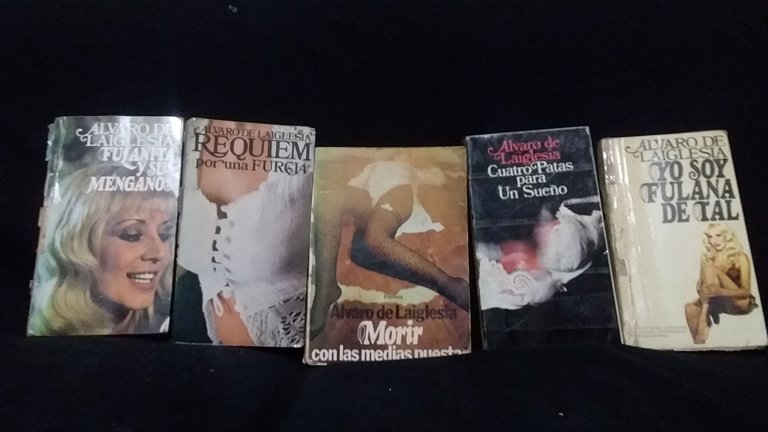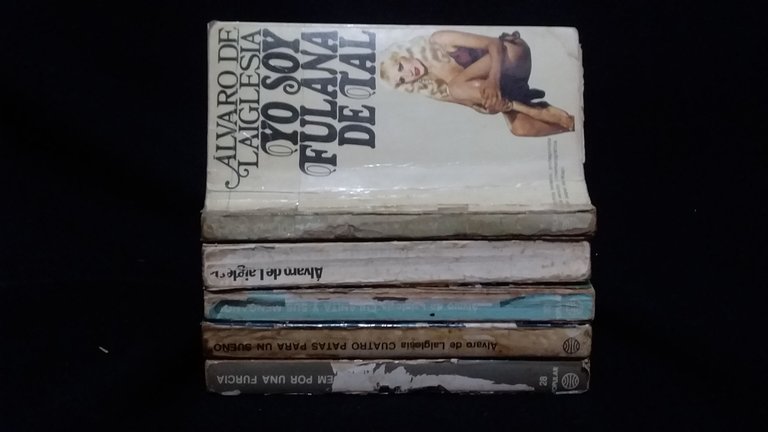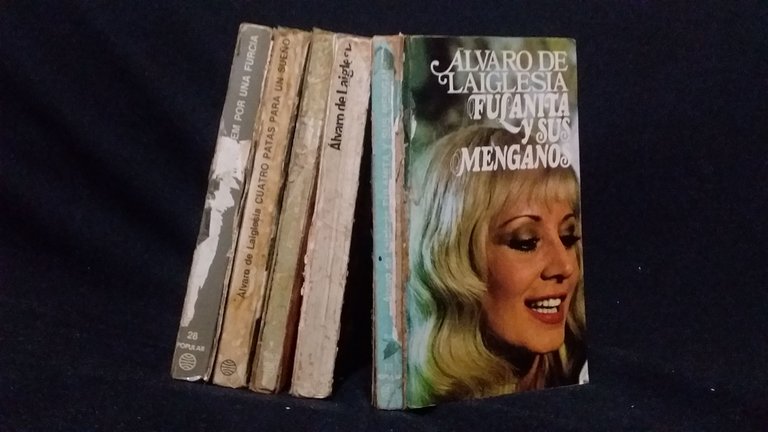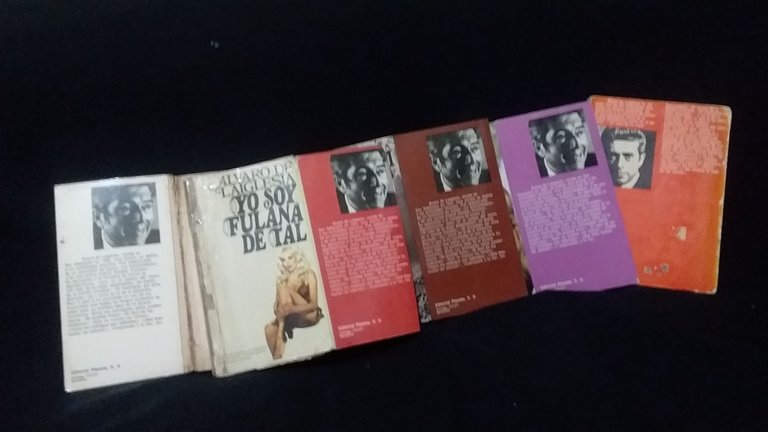
Escribir cinco novelas usando el mismo personaje no es asunto de soplar e inflar botellas; y escribir cinco novelas con un mismo personaje, pero manteniendo un humor refinado, un derroche de frases bien hiladas, con un lenguaje directo, sencillo; que te envuelve desde las primeras páginas del libro, es algo que solo Álvaro de Laiglesia podía hacer.
Y precisamente hoy, 9 de septiembre, este escritor estaría festejando su nacimiento. Hace dos años, mi amigo, el escritor Tomás Jurado Zabala @tomasjurado me regaló sus cinco libros de Álvaro de Laiglesia; recuerdo que antes de entregármelos me dijo; si quieres aprender a escribir con humor o si quieres solo aprender a disfrutar de alguien que sabe escribir con humor, lee esta obra.
Writing five novels with the same character is not a matter of blowing and inflating bottles; and writing five novels with the same character, but maintaining a refined humor, a waste of well-spun sentences, with a direct and simple language that envelops you from the first pages of the book, is something that only Álvaro de Laiglesia could do.
And precisely today, September 9, this writer would be celebrating his birth. Two years ago, my friend, the writer Tomás Jurado Zabala @tomasjurado gave me his five books by Álvaro de Laiglesia; I remember that before giving them to me he told me; if you want to learn to write with humor or if you want to simply learn to enjoy someone who knows how to write with humor, read this work.

Para entonces leí el primer libro, Yo soy fulana de tal, y como tuve que viajar, postergué los otros. Pero hace dos meses reinicié su lectura y como el tipo tiene madera de la buena, volví a empezar con el tomo uno, y actualmente voy en la mitad del segundo, Fulanita y sus menganos.
Conocer a este escritor me recordó que no hay nada serio que no pueda decirse con mucho humor, porque toda la obra de Álvaro de Laiglesia está narrada humorísticamente; hasta lo más terrible que le sucede a Mapi, la protagonista, el autor lo dosifica en beneficio de su estilo. Uno sabe que la vida de una prostituta no es pan con mantequilla; uno sabe que son seres humanos frágiles, que a fuerza de hacerse las duras terminan soportando sus desdichas, porque ¿qué dicha puede haber en sus vidas si les toca consumir, sí, el pan duro, pero amargo?, porque eso de tirarse encima lo peorcito del mundo que son algunos hombres, no tiene rivalidad.
By then I read the first book, Yo soy fulana de tal, and since I had to travel, I postponed the others. But two months ago I resumed reading it and as the guy has good wood, I started again with volume one, and I am currently in the middle of the second one, Fulanita y sus menganos.
Meeting this writer has reminded me that there is nothing serious that cannot be told with a lot of humor, because all of Álvaro de Laiglesia's work is narrated with humor; even the most terrible things that happen to Mapi, the protagonist, the author doses them for the benefit of his style. It is known that the life of a prostitute is not bread and jam; it is known that they are fragile human beings, who by dint of playing hard to get, end up enduring their misfortunes, because what happiness can there be in their lives if they have to consume, yes, hard bread, but bitter, because some men are the worst in the world and that is what they have to face.

Y todo esto no los va relatando Álvaro de manera magistral; su narración es como si nos riéramos de un chiste bueno, en medio de la peor de nuestras calamidades; y con la Mapi hay un derroche de encontronazos feos, y uno los va disfrutando como lector.
Pero, además, hay en la obra de Álvaro de Laiglesia una crítica muy profunda a la sociedad y particularmente a otras obras literarias; y aquí voy a contarles una anécdota particular. En un artículo anterior comenté que estaba leyendo Crimen y castigo, de Fiódor Dostoievski, una obra psicológica a la que le estoy dedicando una hora de la mañana; pues, resulta que ya voy entrando en el último tercio de un total de 500 páginas y nada que descubren al asesino; ya me estaba haciendo esa pregunta cuando anoche, precisamente, leyendo a Fulanita y sus Menganos, Álvaro, a través de Mapi, metía la cuchara para referirse a esa novela gorda que dejó muy mal parado a la policía rusa.
Decía la Mapi, que los detectives del resto de Europa eran fenomenales, porque eran capaces de resolver cualquier crimen en menos de 50 páginas; en cambio los rusos fueron incapaces hacerlo en más de 500; y si no hubiese sido poque el asesino tenía conciencia y se entregó, todavía estuviera matando viejas con su hacha. Es que esta Mapi, a la que ya le tengo afecto, no es cualquier prostituta, si hasta leyó al Quijote.
And all this is not narrated masterfully by Alvaro; his narration is as if we were laughing at a good joke, in the midst of the worst calamities; and with Mapi there are many ugly encounters, and one enjoys it as a reader.
But, in addition, there is in Alvaro de Laiglesia's work a very deep criticism of society and particularly of other literary works; and here I am going to tell a particular anecdote. In a previous article I commented that I was reading Crime and Punishment, by Fyodor Dostoyevsky, a psychological work to which I am devoting an hour in the morning; well, it turns out that I am already entering the last third of a total of 500 pages and the murderer has not yet been discovered; I was already asking myself that question when last night, precisely, reading Fulanita and her Menganos, Alvaro, through Mapi, put his spoon to refer to that fat novel that left the Russian police in a very bad place.
Mapi said that the detectives in the rest of Europe were phenomenal, because they were capable of solving any crime in less than 50 pages; on the other hand, the Russians were incapable of doing it in more than 500; and if it had not been because the murderer had a conscience and turned himself in, he would still be killing old ladies with his axe. This Mapi, whom I am already fond of, is not just any prostitute, she has even read Don Quixote.

El asunto es que uno termina queriendo a la Mapi, pero no para acostarse con ella, no vaya usted a creer semejante absurdidad siendo uno casado; uno la quiere porque ella sufre, pero hace reír con su manera de contarnos su vida, y si me lo preguntan, pues hasta hace moquear de vez en cuando.
Creo que esta es la mejor manera de celebrar la vida de un escritor, leyendo su obra.
The thing is that you end up loving Mapi, but not to sleep with her, you wouldn't believe that nonsense if you were married; you love her because she suffers, but she makes us laugh with her way of telling us about her life, and if you ask me, she even makes us runny nose from time to time.
I think this is the best way to celebrate a writer's life, by reading her work.

The rewards earned on this comment will go directly to the people sharing the post on Twitter as long as they are registered with @poshtoken. Sign up at https://hiveposh.com.
Esta publicación ha recibido el voto de Literatos, la comunidad de literatura en español en Hive y ha sido compartido en el blog de nuestra cuenta.
¿Quieres contribuir a engrandecer este proyecto? ¡Haz clic aquí y entérate cómo!
Gracias por el apoyo.
Recordar con humor es muy sabroso. @jesuspsoto
Felicitaciones por tu post de Álvaro de la Iglesia.
Agradecido por su lectura.